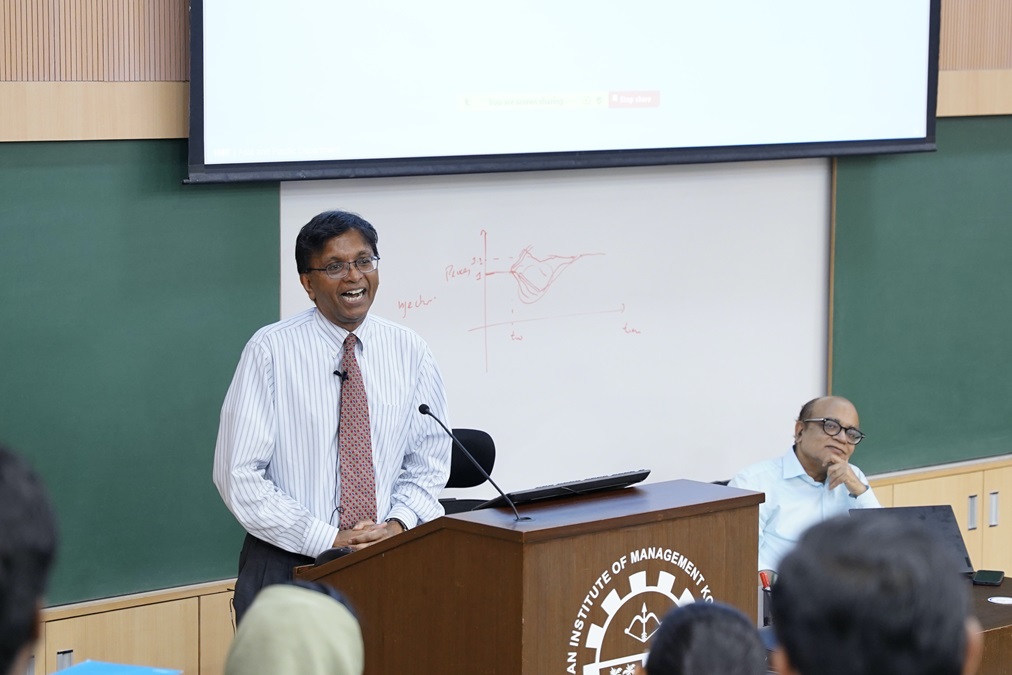

KOZHIKODE:
Veteran IMF staffer, Dr. Ranil Salgado who joined as IMF’s Senior Resident Representative for India and Bhutan after heading IMF’s Japan desk said that India today is an important engine of global growth underpinned by prudent macroeconomic polices, significant potential and opportunities out of favourable demographics, digitalization, capital spending push, and managing the green transition. It may soon become the largest contributor to global growth but the critical requirements were comprehensive structural reforms and continued macroeconomic and financial stability. Ranil was delivering the First Mimansa lecture on “India’s Growth and Prospects in an Uncertain World” at the International Workshop on Complexity Economics organized by Uruppika, IIM Kozhikode’s Centre for Macroeconomics, Banking & Finance on Tuesday.
On the policy mix he advised that fiscal policy should rebuild buffers by sustainably reducing public debt, while boosting inclusive growth. Monetary policy should remain data dependent while seizing the opportunity to lower inflation rate to the 4 percent target. Financial policies should continue to promote resilience, while structural policies should harness demographic dividends while invigorating inclusive and green growth. He added that labour productivity was not driving growth and, in particular, remains low in agriculture and construction.
Describing global growth as “underwhelming”, he said that global growth was at risk from trade tariffs, migration restraint and tightening of the global financial conditions. New trade restrictions had climbed up rapidly in 2024 in Americas, Europe and Asia & Pacific were putting global growth at risk.
As part of its surveillance mandate, the IMF is undertaking Article IV and FSAP assessments this year and it is expected to release its assessment early next year.
At the workshop, Prof. Mridul Saggar engaged in discussing current complexities across globe and said that adoption of Artificial Intelligence has already set in a chain of gale of creative destruction affecting about 40 percent of the jobs and bringing about total factor productivity enhancements that some estimates place as high as 0.68% a year. He cautioned that the new technologies could cause financial instabilities and wanted IMF to focus on weak regulation of these in advanced economies in a misplaced notion of creating national champions that is eroding consumer welfare.
Prof. Vipin Veetil dwelled into need for looking and the heterogenous agent behaviours in various businesses pointing out disequilibrium prevailed in various markets with irrational behaviours and information gaps. Prof. Robert Axtell’s models were discussed at length in this context.
more recommended stories
MUMBAI:Amid India’s push toward a $5.
KOCHI:Aster Medcity, in association with Aster.
THIRUVANANTHAPURAM:In a significant advancement towards fostering.
KOZHIKODE:The Indian Institute of Management Kozhikode.
SHRAVASTI (UP):Bharat Petroleum Corporation Limited (BPCL).
MUMBAI:As businesses worldwide accelerate their adoption.
THIRUVANANTHAPURAM:UST, a leading digital transformation solutions.
MUMBAI:ACCA (the Association of Chartered Certified.
KOCHI:Continuing its mission to empower bright.
MUMBAI:As digital transformation accelerates, data has.